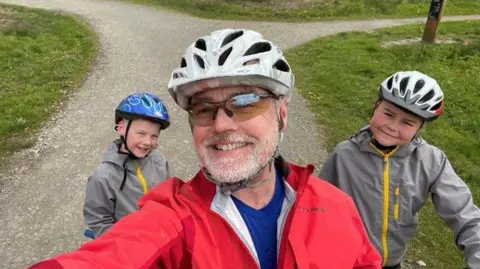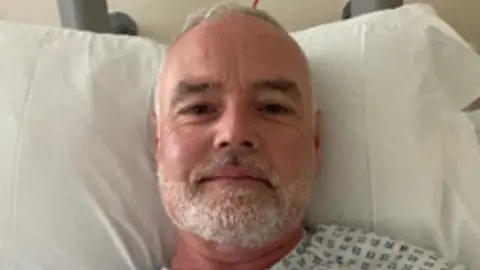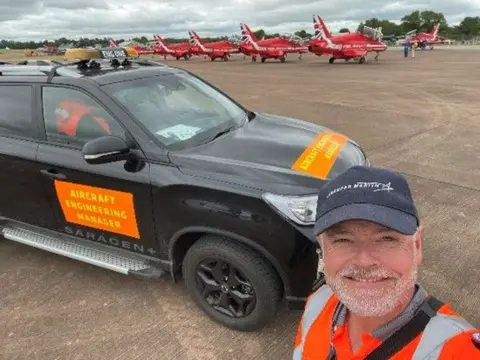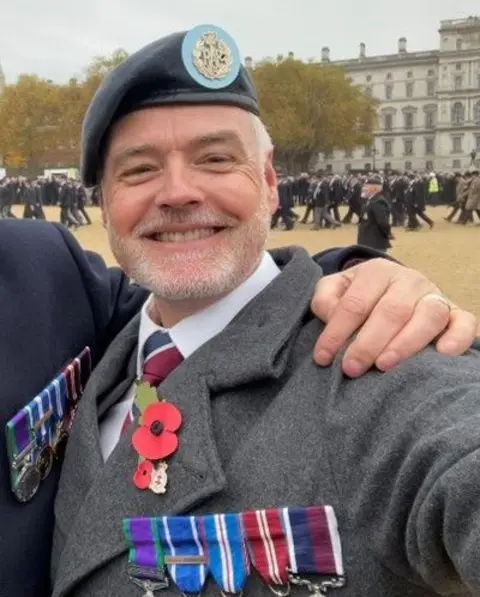'Lowering the cancer screening age saved my life'
 Andy Robinson
Andy RobinsonAndy Robinson had no symptoms and did not feel ill when he was given a bowel cancer screening test in the post.
But he decided to send off a sample and then received the news that no-one wants to hear.
He was diagnosed with stage one bowel cancer in July 2024, and was told he needed surgery, but would not require chemotherapy or radiotherapy because it had been found at an early stage.
Historically, screening started at 60, but the age has gradually been lowered, which Mr Robinson, 54, credited with saving his life.
 Andy Robinson
Andy RobinsonHe is now urging other people to take the at-home Faecal Immunochemical Test (FIT) test, which is currently available to anyone over the age of 50.
Mr Robinson said: "I feel very lucky that the age of bowel cancer screening has been lowered, if I hadn't had the opportunity to participate in the programme, it could've been a completely different and more serious situation.
"For me it's saved my life. It's given me the extension of my life by having that early detection."
'Don't put it off'
He added his experience has had significant impact on close friends, including one who confessed to leaving his own FIT kit test in his bedside table for many years.
NHS data indicates that approximately one in three people across England who are sent a FIT kit test do not complete and return it.
"It prompted my friends to also do their tests," Mr Robinson said. "It woke people up to bowel cancer and the fact that it's such a simple and easy test.
"It just drops through the door, and I can't express how simple and easy it is to do.
"Don't put it off or bury your head in the sand. You don't want to be on the treatment journey in a worse diagnosis position further down the line."
 Andy Robinson
Andy RobinsonMr Robinson, who served with the RAF for 25 years and now works at Rolls-Royce in Derby, was invited for a colonoscopy after the initial test detected blood in his stool.
Samples were then taken from his bowel and he was given a CT scan before he received his diagnosis.
Before his surgery, he was given the chance to take part in the Exercise Prehabilitation in Colorectal Cancer (EPiC) programme at the Royal Derby Hospital.
The programme designs exercise regimes for patients due to have abdominal surgery in an effort to aid their recovery post-surgery.
Mr Robinson said the programme gave him "something to focus on and a distraction from worrying in those six weeks leading up to my operation".
 Andy Robinson
Andy RobinsonAnd since his surgery, he has been trying to tick more things off his bucket list.
He travelled to London two months after his operation to take part in the Remembrance Day parade.
"It was a great feeling. I've always wanted to go and experience it first-hand, and the atmosphere was amazing," said Mr Robinson.
"I saw it as a good way to celebrate my positive outcome from the journey I'd just been through and spread awareness to my friends in the military family.
"I've kept putting off getting another VW campervan, but this made me think 'you can't keep postponing the things you really want to do'.
"I want our two young boys to come away with me and my wife and for us to make memories together."
Follow BBC Derby on Facebook, on X, or on Instagram. Send your story ideas to [email protected] or via WhatsApp on 0808 100 2210.
